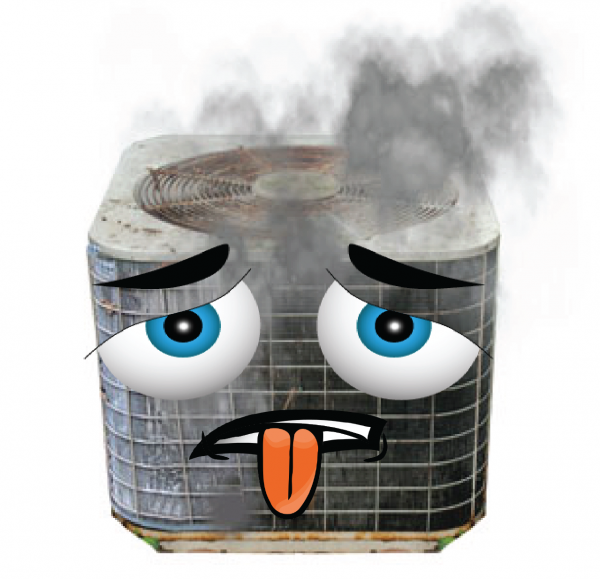Air Conditioner Checklist For the Southern New Hampshire Hot Summer Days
SkyWalker HVAC Co-owner Ryan Walker
Let’s face it, we all love summer, but the humidity can be a bit too much, and that’s why we eventually turn on that Air Conditioner. Spring rolls along, and we open our windows to do some cleaning. Before we know it, it’s 80 degrees, and the air is thick. The days are hot, and even the nights here in Southern New Hampshire can be too hot to sleep.
That’s why it’s so important to get your Air Conditioner tested and up and running well before you need it. Today, I’m going to go over some things you can do to make sure your Air Conditioner is ready for the summer. We will also cover how to check if your Air Conditioner is having any issues.
How Humidity Affects Indoor Air Quality in Southern New Hampshire
When the Heat Index (temperature + humidity) is high, we get uncomfortable. It’s not just the high temperatures, but the rising humidity level that is causing many issues for our homes and health. The thick, heavy air contains moisture that lingers in the atmosphere, creating the perfect conditions for mold spores to begin growing. These mold spores can irritate the lungs and trigger respiratory issues.
The probability of heat stroke increases as humidity levels rise because our bodies have a harder time sweating in humid environments. Asthma is sometimes irritated by humidity, and allergies can get triggered when the moisture in the air is too high. It can even increase the likelihood of pests in your home because they love humid conditions.
High humidity levels cause wood to expand, which can create problems with your home's indoor furniture and other wooden surfaces. It is recommended to maintain indoor air humidity levels between 40% and 60% for optimal air quality. Using a high-quality Air Conditioner helps reduce moisture in the air. In certain areas, such as damp basements, you can install a dehumidifier to reduce the humidity level further.
Air Conditioner to-do list for Southern New Hampshire
First, you should check the outside unit and how it has withstood the long winter. The outdoor elements can expose the unit to threats.
1. Look for any debris around the Air Conditioning Unit and remove it.
2. Clean the outside of the unit with safe cleaning products.
3. Check if any animal nests are present or located within the unit. Sometimes they winter over around the outside Air Conditioner unit.
4. Inspect the refrigerant pipes for signs of damage and check the fan to ensure it appears intact.
5. Ensure that any landscaping features, such as bushes, shrubs, or other plants, growing around the outdoor unit do not impede the unit's operation. You should keep all vegetation a few feet away from the Air Conditioning Unit so that it can operate safely.
Now, go inside the house to inspect the indoor Air Conditioning system.
1. Go ahead and vacuum any dust that has accumulated around the unit, and also check for any pests that may have made a nest for the winter.
2. Air filters should be replaced at the start of the new season. So if you don’t have a new one, order one. If the filter is reusable, clean it thoroughly according to the manufacturer's recommendations.
3. Now, go ahead and test the unit by turning it on under a very low setting first.
How to Determine if Your Air Conditioning Unit Is Operating Properly
It is better to test your AC unit before you actually need it. Catching issues before they get more serious can sometimes avoid costly repairs or even the need to replace the Air Conditioning Unit. Several factors should be considered when evaluating the performance of your AC unit.
The air blowing from your vents should be cool; if it is not, check to ensure that you have set the thermostat to “cool” mode. If it is set to the cool setting but still blowing warm air, there may be an issue with the refrigerant lines. Often, if the compressor is failing, it will also produce warm air. Lastly, it could just be an issue with the thermostat not calculating the proper temperature or having some other problem.
If the air blowing from the vents is very weak or less than you remember, this could also be an issue. The air ducts may have had some issues, causing the air not to flow through the ductwork correctly. It may also be an issue with the compressor in the Air conditioning unit.
Air conditioning units can sometimes make some funny and strange noises. They almost always produce some sound or humming when working, but if the sound is different from what you remember or is excessively loud, it could be an issue with the unit. There are components in the unit that, if they fail, will produce different sounds. HVAC Technicians are experts at discerning what sounds are good or bad. Give us a CALL and we will check it out.
Do you smell an odor that is unpleasant when the AC is on? If mildew and mold build up in the ductwork, they can produce odors that are pushed through by the airflow. If a burnt smell is detected, you might have an issue with the electrical components or wiring. Stop the unit immediately if any of these smells are detected.
Sometimes, the AC unit keeps turning on and off more frequently than it is supposed to; this means the unit is experiencing an issue. When an Air Conditioner is cycling on and off at rates higher than usual, you may have a problem with the refrigerant levels or a clogged air filter. Even something as simple as the thermostat having issues can cause the AC unit to turn on and off more frequently than it should.
If any of these issues are detected, you should STOP using the Air Conditioner unit and contact a certified HVAC professional. At SkyWalker HVAC, we can send our technicians to diagnose the issue and determine what can be done to get the AC unit back up and running.
That’s why it's so important to check the Air conditioning unit before the hot and humid summer gets underway. Air Conditioning manufacturers recommend having a certified technician inspect the unit once a year. At SkyWalker HVAC, we service all of Southern New Hampshire and Northern Massachusetts. Contact us by phone or through our website contact form to schedule your annual maintenance for your AC unit.
Tips for Lowering Your Utility Bill When Using Your Air Conditioning Unit in Southern New Hampshire
We have already covered how to check for issues in your AC unit, but that is one of the main causes of increasing utility bills. When an air conditioner is not functioning correctly, it can use more energy, resulting in higher utility costs. The number one thing you can do is keep up with regular maintenance.
The next thing you can do to lower utility bills during the summer is to add some fans to your house. Fans can help circulate the air around the house, making the Air Conditioner even more efficient. The more air flow is increased, the more the temperature and humidity can be lowered. Even though the AC unit pushed air through the air ducts and out of the vents, the addition of fans will improve performance even further and save you a few bucks!
Lastly, please make sure you are using a smart thermostat that is up to date. You want your AC unit to be programmable so that at certain times of the day, it can work specifically for your needs. Most newer AC units come with the ability to program the unit for different functions depending on the time of day. Using this feature will ensure that you optimize energy usage so that it does what it needs to and no more.
If you need any help or would like to schedule a yearly service on your Air Conditioner Unit, please give us a call today or schedule an appointment online, and we will get back to you as soon as possible.





